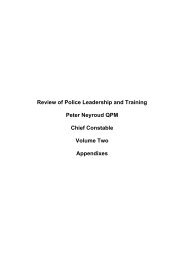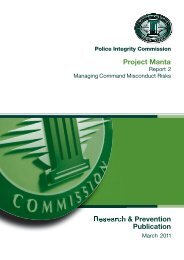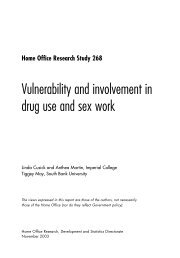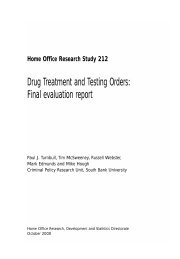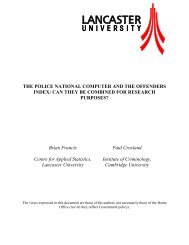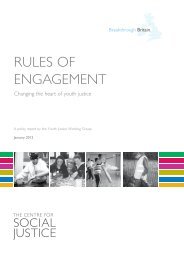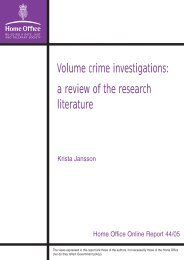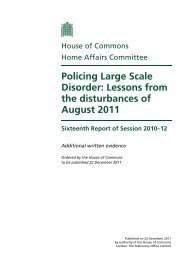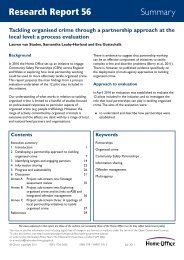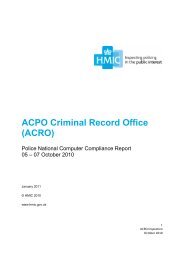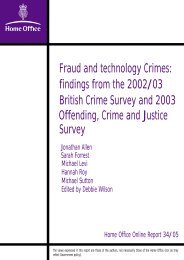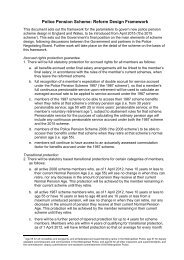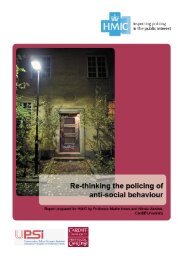Reducing Bureaucracy in Policing - Home Office
Reducing Bureaucracy in Policing - Home Office
Reducing Bureaucracy in Policing - Home Office
You also want an ePaper? Increase the reach of your titles
YUMPU automatically turns print PDFs into web optimized ePapers that Google loves.
Crime & Incident Record<strong>in</strong>g, Custody, Case Build<strong>in</strong>g, Miss<strong>in</strong>g Persons,<br />
Domestic Abuse, National Intelligence Model (NIM), Performance<br />
Development reviews (PDR) & RIPA Authority’s .<br />
In previous reports I have highlighted the need for ACPO to apply a more proportionate and<br />
measured approach to streaml<strong>in</strong>e and rationalise all these key processes. I welcome the work<br />
recently undertaken by HMIC and ACPO to remove duplication and over-work<strong>in</strong>g.<br />
Process mapp<strong>in</strong>g - Most systems and processes have been mapped <strong>in</strong> one form or another<br />
across forces, but the requisite rationalisation, cultural shift and challenge has not necessarily<br />
been undertaken.For example, Project Athena referred to <strong>in</strong> the technology section of this report<br />
have mapped 4 key processes, each is an amalgam of the 9 collaborat<strong>in</strong>g forces, and written at a<br />
level and <strong>in</strong> a language that all forces can identify with. I do not under-estimate the amount of time<br />
it has taken to achieve this level of consensus and it will be important, as this work develops to<br />
further streaml<strong>in</strong>e the processes <strong>in</strong> a way that delivers the greatest efficiencies rather than an<br />
acceptable compromise of processes across the forces concerned. To maximise the potential of<br />
re-eng<strong>in</strong>eer<strong>in</strong>g processes it is important to look at the system as a whole and remove all aspects<br />
that add no value to the overall purpose.<br />
Where trust and responsibility is not appropriately devolved excessive numbers of gatekeepers<br />
(decision-makers) are added to systems and processes,extend<strong>in</strong>g the process and creat<strong>in</strong>g<br />
additional cost and unnecessary delay (bureaucracy). It also fails to place responsibility as near as<br />
possible to where the impact is felt. For example, where poor performance or mistakes have been<br />
made (<strong>in</strong>correct or <strong>in</strong>complete record keep<strong>in</strong>g, wrong classification, miss<strong>in</strong>g evidence) additional<br />
gatekeepers have been added (call handl<strong>in</strong>g, case build<strong>in</strong>g) to put it right, rather than place<br />
responsibility on the officer or member of staff to get it right first time and hold<strong>in</strong>g them to account.<br />
When systems and processes are streaml<strong>in</strong>ed and rationalised consideration needs to be given to<br />
where decisions are taken and what value each decision po<strong>in</strong>t adds to the process. For example a<br />
student officer <strong>in</strong>vestigat<strong>in</strong>g a simple burglary told me his work was reviewed and directed by n<strong>in</strong>e<br />
different supervisors, each one need<strong>in</strong>g to demonstrate their value by add<strong>in</strong>g a further requirement<br />
on the student officer, who then had to demonstrate (<strong>in</strong> writ<strong>in</strong>g) he had completed all the ‘actions’.<br />
Trust and hold to account, design <strong>in</strong> quality assurance and <strong>in</strong>spection at the po<strong>in</strong>t where the<br />
decisions should be taken not across the whole system.<br />
Focus Crime & Incident Record<strong>in</strong>g<br />
In my Full Report I set out the arguments for accurate and trusted crime and <strong>in</strong>cident record<strong>in</strong>g.In<br />
its simplest form, all reported crimes and <strong>in</strong>cidents need to be accurately and proportionately<br />
recorded to aid <strong>in</strong>vestigation/response and audit (accountability).<br />
The National Crime and Incident Record<strong>in</strong>g Standards (NCRS, NSIR) support this <strong>in</strong> a<br />
standardised and consistent way,for example a burglary categorised <strong>in</strong> the same way wherever<br />
committed. Neither standard prevents crimes or <strong>in</strong>cidents from be<strong>in</strong>g recorded <strong>in</strong> a proportionate<br />
way.<br />
There is an arguement for rationalisation of the notifiable offences list 13 (NOL) and broaden<strong>in</strong>g<br />
the categories of crimes required to be reported and recorded nationally. Some propose a split<br />
between serious and less serious, others the adoption of up to ten broad categories of crime. I<br />
believe the current list, with over 1,300 def<strong>in</strong>itions of offences, collects greater detail than is<br />
necessary and on balance believe less but broader national categories could be developed. The<br />
13 Notifiable offences covers a wide range of offences from murder to m<strong>in</strong>or theft and are published nationally as police<br />
recorded crime statistics<br />
25



